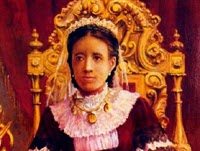Augusta Christine Fells was born on February 29, 1892, in Green Cove Springs, Florida. She began making sculptures as a child, using the natural clay abundant in her area. She liked to sculpt animals and other small figures, but her father didn't approve of it,
and did whatever he could to stop her. He was a Methodist minister and believed it was a sin to make "graven images." Savage once said that her father "almost whipped all the art out of me."
 But when he found a statue she sculpted of the Virgin Mary, he changed his mind. She entered some of her pieces into county fairs and won a number of honors. When she could not create a successful career as a sculptor in Florida, she moved to New York City, where she was able to study at the Cooper Union, which offered free tuition, and eventually even gave her a scholarship for her living expenses.
But when he found a statue she sculpted of the Virgin Mary, he changed his mind. She entered some of her pieces into county fairs and won a number of honors. When she could not create a successful career as a sculptor in Florida, she moved to New York City, where she was able to study at the Cooper Union, which offered free tuition, and eventually even gave her a scholarship for her living expenses.
While she was at Cooper Union, she applied for a program to study sculpture abroad in France, but was denied solely because of her race. Instead of taking it lightly, she raised a fuss, wrote letters to the media, bringing attention to the racists practices of the program. The program still refused to accept her, but her life was changed, and she became quite active in the civil rights fight. And she became better acquainted with the movers and shakes in the movement. She was even commissioned to sculpt busts of famous civil rights leaders like W.E.B. Du Bois and Marcus Garvey.
You may also be interested in:
Mary McLeod Bethune: suffrage and civil rights work
Mary McLeod Bethune's work with her school was remarkable in itself, and had she only focused on that, she would still be heralded for her contributions to society. But she did not. She could not. Her experiences trying to improve the lives of young African American women showed her that there was much work to be done -- both for their race and for their gender.
Happy Birthday - Septima Poinsette Clark
Septima Poinsette was born on May 3, 1898, in Charleston, South Carolina. Her father had been born a slave, and worked as a caterer after the Civil War. Her mother was born free in Charleston, but was taken to Haiti during the Civil War. After the war, she worked as a launderer, but did not work for whites, and refused to let her daughters work in white houses...
Eliza Ann Grier - the first black woman to receive a MD in Georgia
Very little is known about her early life. She was born during the Civil War. Her parents were slaves in Mecklenburg County, North Carolina, which made her a slave as well. After emancipation, her family moved to Atlanta, where she grew up and attended school. She originally intended to become a teacher, and attended Fisk University.
"From the time I can first recall the rain falling on the red clay in Florida. I wanted to make things. When my brothers and sisters were making mud pies, I would be making ducks and chickens with the mud."
(source: TheHappyNappyBookseller)
 But when he found a statue she sculpted of the Virgin Mary, he changed his mind. She entered some of her pieces into county fairs and won a number of honors. When she could not create a successful career as a sculptor in Florida, she moved to New York City, where she was able to study at the Cooper Union, which offered free tuition, and eventually even gave her a scholarship for her living expenses.
But when he found a statue she sculpted of the Virgin Mary, he changed his mind. She entered some of her pieces into county fairs and won a number of honors. When she could not create a successful career as a sculptor in Florida, she moved to New York City, where she was able to study at the Cooper Union, which offered free tuition, and eventually even gave her a scholarship for her living expenses.While she was at Cooper Union, she applied for a program to study sculpture abroad in France, but was denied solely because of her race. Instead of taking it lightly, she raised a fuss, wrote letters to the media, bringing attention to the racists practices of the program. The program still refused to accept her, but her life was changed, and she became quite active in the civil rights fight. And she became better acquainted with the movers and shakes in the movement. She was even commissioned to sculpt busts of famous civil rights leaders like W.E.B. Du Bois and Marcus Garvey.
And she did eventually travel to Paris on the Julius Rosenwald Fellowship, while enabled her study for one year. When she returned to Harlem, she was very active in the art scene, taught classes in the community, and in 1932 established the Savage Studio of Arts and Crafts. A few years later, she became the first director of the Harlem Community Arts Center -- which is considered to be the forerunner of similar community arts centers around the country.
If you like the work I do here at Self-Rescuing Princess Society,
please check out my Patreon.
please check out my Patreon.
You may also be interested in:
Mary McLeod Bethune: suffrage and civil rights work
Mary McLeod Bethune's work with her school was remarkable in itself, and had she only focused on that, she would still be heralded for her contributions to society. But she did not. She could not. Her experiences trying to improve the lives of young African American women showed her that there was much work to be done -- both for their race and for their gender.
Happy Birthday - Septima Poinsette Clark
Septima Poinsette was born on May 3, 1898, in Charleston, South Carolina. Her father had been born a slave, and worked as a caterer after the Civil War. Her mother was born free in Charleston, but was taken to Haiti during the Civil War. After the war, she worked as a launderer, but did not work for whites, and refused to let her daughters work in white houses...
Eliza Ann Grier - the first black woman to receive a MD in Georgia
Very little is known about her early life. She was born during the Civil War. Her parents were slaves in Mecklenburg County, North Carolina, which made her a slave as well. After emancipation, her family moved to Atlanta, where she grew up and attended school. She originally intended to become a teacher, and attended Fisk University.






























